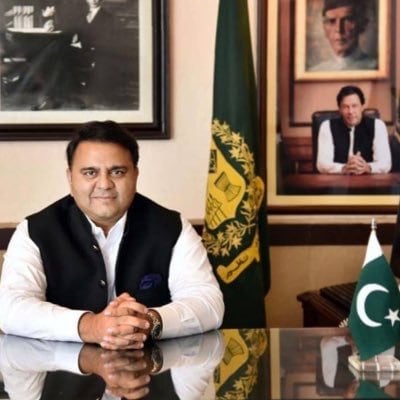Though the government has moved to grant abroad Pakistanis voting rights, Federal Minister for Information and Broadcasting Fawad Chaudhry has said that he is personally opposed to granting expatriates electronic voting rights.
While stating that the postal ballot option would be safer than enabling expatriates to vote online or over the internet, the information minister said that it is presently being disputed what would be the safest and best manner for foreigners to exercise their right to vote in the next elections.
“Personally, I am not in favor of online or internet-based voting for the overseas Pakistanis,” Fawad told The Express Tribune, adding that a secure method would be adopted as the whole focus is to make the 2023 elections transparent and free from controversies.
The declaration comes despite opposition parties’ concerns that the major drawback of an electronic voting machine (EVM) is election hacking, claiming that if electronic voting is done online and over the internet, the results might be tampered with.
The opposition has already expressed various concerns, including the process for ensuring the integrity of the vote and how all parties would communicate with expats throughout the world.
They further said that election changes enacted via ordinances were not sustainable in the long term.
To the opposition’s question about how presiding officers and polling agents will be appointed, and whether voting will be done by constituency or in any other way if expats are given the right to vote, Fawad said that overseas Pakistanis had already registered as voters in various constituencies and that a proper mechanism for allowing them to vote was being planned.
Regulations must be altered as part of electoral reforms, according to the government’s spokesman, who added that the government’s electoral reforms are divided into four parts: EVMs, e-voting for abroad Pakistanis, biometrics, and law.
The prototype of an EVM has already been developed and presented to parliamentarians, according to Fawad, who also stated that the President has already promulgated an ordinance granting voting rights to overseas Pakistanis and allowing the Election Commission of Pakistan (ECP) to use EVMs while biometric and e-voting systems are being developed.
When asked what would happen if the ordinances were to expire, Chaudhry said that the ordinances were passed so that ECP and other institutions could begin working on the suggested ideas right away, rather than later claiming that they didn’t have enough time.
He was optimistic that the administration will find a way to get the laws granting expats voting rights and conducting elections using electronic voting machines through parliament.
Chaudhry said the administration is committed to electoral reform and that the electronic voting method is a step ahead of the current system in terms of ensuring election transparency.
Apart from openness, he claims that the electronic voting method would not only assure rapid and accurate results but would also assist to halt the blame game that follows every election.










